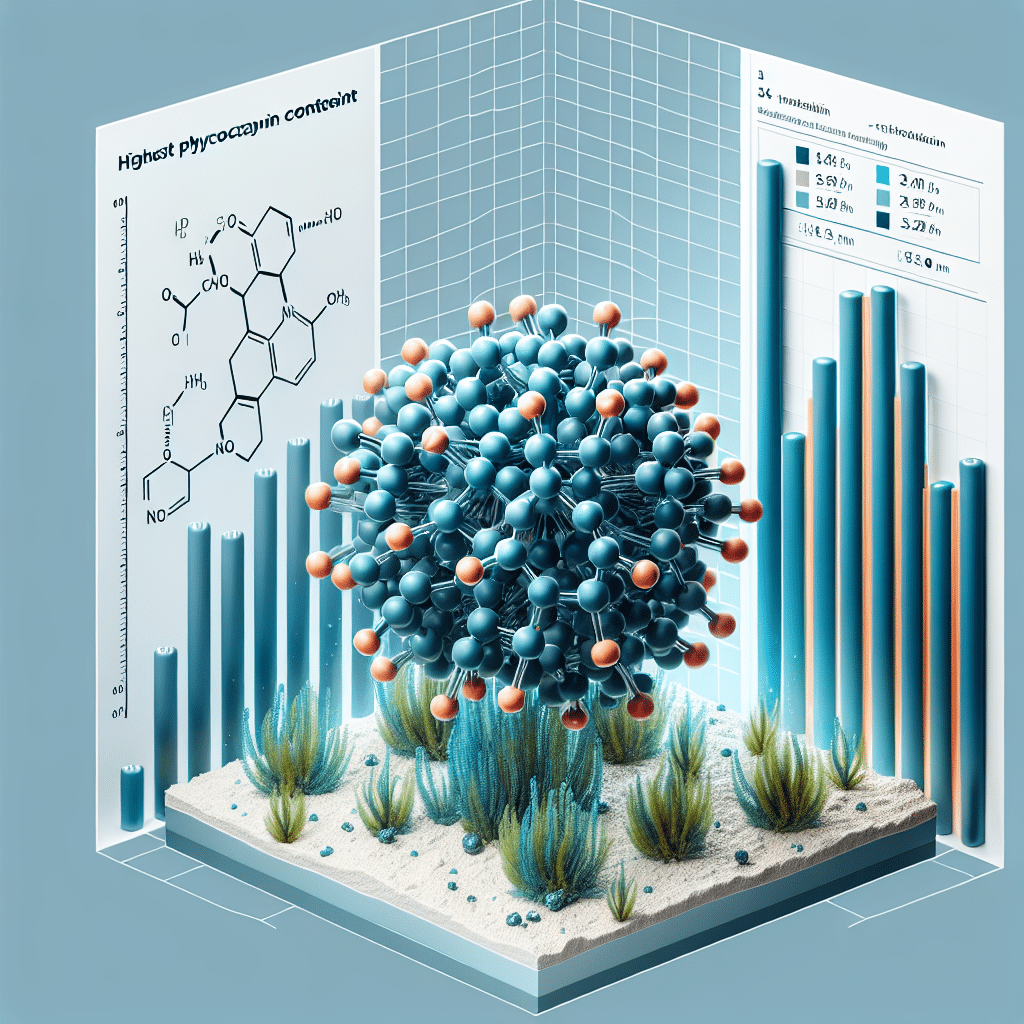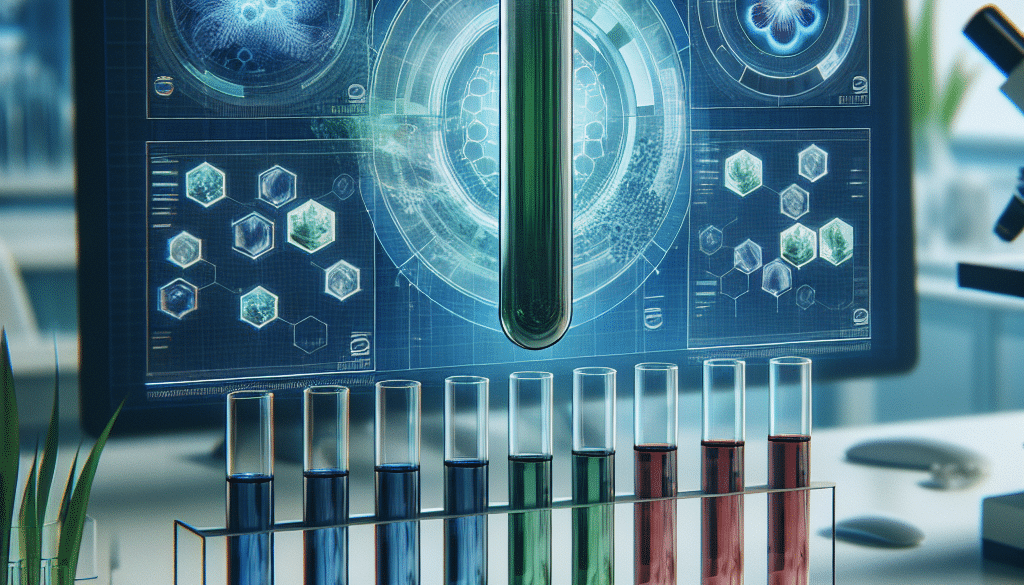What Is The Highest Phycocyanin Content?
-
Table of Contents
- Highest Phycocyanin Content: Unveiling the Superfood Power
- Understanding Phycocyanin and Its Benefits
- Measuring Phycocyanin Content
- Factors Affecting Phycocyanin Content
- Algae with the Highest Phycocyanin Content
- Case Studies and Research
- Commercial Production and Applications
- Conclusion: The Superfood Race for the Highest Phycocyanin Content
- Discover ETprotein’s High-Quality Protein Products
Highest Phycocyanin Content: Unveiling the Superfood Power

Phycocyanin is a pigment-protein complex from the light-harvesting phycobiliprotein family, and it’s also a potent antioxidant, anti-inflammatory, and neuroprotective agent. It is found in cyanobacteria, also known as blue-green algae, with Spirulina being one of the most notable sources. The quest for the highest phycocyanin content is not just a matter of scientific curiosity; it has significant implications for health, nutrition, and the burgeoning superfood industry.
Understanding Phycocyanin and Its Benefits
Before diving into the specifics of phycocyanin content, it’s essential to understand what phycocyanin is and why it’s so valuable. Phycocyanin is responsible for the distinctive blue color of certain algae and plays a crucial role in photosynthesis. However, its benefits extend far beyond its role in nature.
- Antioxidant properties: Phycocyanin is known for its ability to fight free radicals, which can damage cells and lead to chronic diseases.
- Anti-inflammatory effects: It can help reduce inflammation in the body, which is a common pathway for many diseases.
- Neuroprotection: Phycocyanin has been shown to protect neurons from damage, which is promising for neurodegenerative disease research.
- Immune system booster: It can enhance the immune system, helping the body to fight off infections and diseases more effectively.
These health benefits have made phycocyanin a sought-after ingredient in dietary supplements, functional foods, and natural health products.
Measuring Phycocyanin Content
The phycocyanin content in algae can vary widely depending on several factors, including the species of algae, growing conditions, and processing methods. Phycocyanin content is typically measured in milligrams per gram (mg/g) of dry weight.
Several methods are used to quantify phycocyanin content, including spectrophotometry, which measures the intensity of color produced by phycocyanin when it absorbs light. This method is widely used due to its simplicity and effectiveness.
Factors Affecting Phycocyanin Content
Several factors can influence the phycocyanin content in algae:
- Species: Different species of cyanobacteria and algae have varying levels of phycocyanin.
- Environmental conditions: Light intensity, temperature, and nutrient availability can affect phycocyanin synthesis.
- Harvesting time: The stage of growth at which algae are harvested can impact the phycocyanin content.
- Extraction and processing methods: Techniques used to extract and process algae can either preserve or degrade phycocyanin.
Algae with the Highest Phycocyanin Content
Among the various sources of phycocyanin, Spirulina stands out as having one of the highest contents. High-quality Spirulina can contain up to 20% phycocyanin by dry weight. However, this number can be even higher under optimal growing conditions and with specialized strains.
Research and development in the field of algae cultivation have led to strains and cultivation techniques that maximize phycocyanin content. For example, certain strains of Spirulina, such as Spirulina platensis, have been reported to have higher phycocyanin content compared to others.
Case Studies and Research
Several studies have investigated the conditions that lead to the highest phycocyanin content in algae. For instance, a study published in the “Journal of Applied Phycology” found that controlling light intensity and temperature could significantly increase phycocyanin concentration in Spirulina cultures.
Another study in the “Algal Research” journal highlighted that nitrogen depletion in the growth medium could enhance phycocyanin accumulation in certain cyanobacteria species. These studies demonstrate that through careful manipulation of environmental factors, it is possible to boost the phycocyanin content in algae.
Commercial Production and Applications
The commercial production of phycocyanin involves cultivating algae in controlled environments, harvesting the biomass, and then extracting the phycocyanin. The highest quality phycocyanin is often sold as a fine powder, which can be incorporated into various products, including:
- Dietary supplements
- Functional foods and beverages
- Nutraceuticals
- Natural food colorants
With the growing demand for natural and functional ingredients, the market for high-phycocyanin products is expanding rapidly.
Conclusion: The Superfood Race for the Highest Phycocyanin Content
In conclusion, the highest phycocyanin content is found in certain strains of Spirulina, with values that can exceed 20% by dry weight under optimal conditions. The quest for the highest phycocyanin content is driven by the compound’s impressive range of health benefits and its potential applications in the food and health industries. As research continues to uncover the best cultivation and extraction methods, we can expect to see even higher concentrations and more effective products on the market.
For those interested in incorporating high-phycocyanin products into their diet or product line, it’s essential to choose reputable suppliers that prioritize quality and purity.
Discover ETprotein’s High-Quality Protein Products
If you’re looking for top-tier protein products, ETprotein is your go-to source. Their extensive range of organic bulk vegan proteins, including options like rice protein, pea protein, and various seed proteins, are perfect for those seeking plant-based nutrition. Additionally, ETprotein offers L-(+)-Ergothioneine (EGT) in various grades, catering to different industry needs.
With a commitment to non-GMO, allergen-free products and a purity of over 98%, ETprotein stands out as a leader in the protein supplement industry. Whether you’re a distributor, trader, or manufacturer, ETprotein can meet your protein requirements with their high-quality offerings.
About ETprotein:
ETprotein, a reputable protein and L-(+)-Ergothioneine (EGT) Chinese factory manufacturer and supplier, is renowned for producing, stocking, exporting, and delivering the highest quality organic bulk vegan proteins and L-(+)-Ergothioneine. They include Organic rice protein, clear rice protein, pea protein, clear pea protein, watermelon seed protein, pumpkin seed protein, sunflower seed protein, mung bean protein, peanut protein, and L-(+)-Ergothioneine EGT Pharmaceutical grade, L-(+)-Ergothioneine EGT food grade, L-(+)-Ergothioneine EGT cosmetic grade, L-(+)-Ergothioneine EGT reference grade and L-(+)-Ergothioneine EGT standard. Their offerings, characterized by a neutral taste, non-GMO, allergen-free attributes, with L-(+)-Ergothioneine purity over 98%, 99%, cater to a diverse range of industries. They serve nutraceutical, pharmaceutical, cosmeceutical, veterinary, as well as food and beverage finished product distributors, traders, and manufacturers across Europe, USA, Canada, Australia, Thailand, Japan, Korea, Brazil, and Chile, among others.
ETprotein specialization includes exporting and delivering tailor-made protein powder and finished nutritional supplements. Their extensive product range covers sectors like Food and Beverage, Sports Nutrition, Weight Management, Dietary Supplements, Health and Wellness Products, and Infant Formula, ensuring comprehensive solutions to meet all your protein needs.
As a trusted company by leading global food and beverage brands and Fortune 500 companies, ETprotein reinforces China’s reputation in the global arena. For more information or to sample their products, please contact them and email sales(at)ETprotein.com today.














